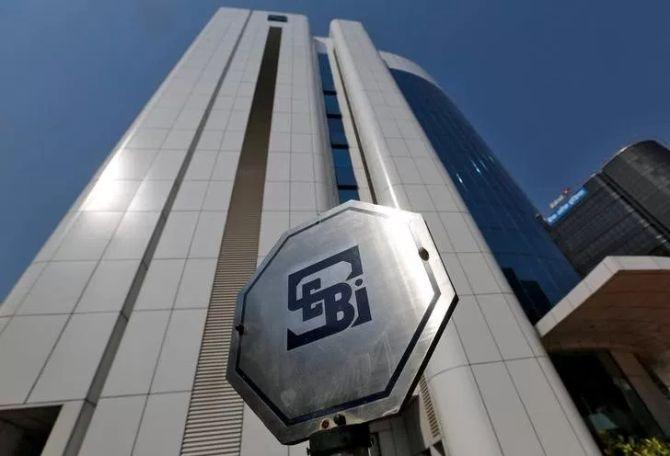'If anybody defaults on something which is due for today, they have to disclose it tomorrow.'
'The accumulation of NPAs is due to asymmetry in information.'
'The investor should have real-time information.'

S Raman, whole-time member, Securities and Exchange Board of India, whose term ended September 6, says disclosure of bad loan defaults within 24 hours would be a game changer in tackling the non-performing assets (NPA) mess.
In an interview with Shrimi Choudhary, Raman shares his views on the National Stock Exchange case, collective investment schemes (CIS) and related challenges.
You were instrumental in shaping the CIS norms. How much money has been raised and how much has been recovered so far?
We have issued only four-five orders in the previous 10 years when there were no rules. But in the past two years, we have cleared 2,500 cases.
I personally issued orders in 300-plus cases within three years.
Over Rs 20,000 crore (Rs 200 billion) has been raised through such schemes where I have passed orders.
Recovery is altogether a different ball game as it is very difficult to recover. This is the harsh reality.
How much money has been raised through such illegal money pooling activities and how much Sebi has recovered so far?
What we did is to curtail future fundraising through publishing our orders across the country. That itself raised the public awareness.
We have managed to do two-three things:
- a. Increase public awareness;
- b. Barred them legally to continue raising the money, hence future fund raising has stopped.
Thirdly in the cases where we are not the regulator, we have allocated the cases to the concerned authority depending on the category of the entity as per the law like the RBI, state government and so on.
We went on with great speed to resolve issues. Nowadays, we hardly get any complaints of ponzi schemes.
The parliamentary committee appreciated the work done by Sebi in resolving all such issues.
Money is hard to recover as the judicial process is the major problem in the matter and people accused in these cases have challenged Sebi orders in various high courts which take long to conclude.
But we have done lot on the investor education front through various social means.
There are a lot of high-profile corporate governance matters constantly raising questions about existing norms.
Sebi recently set up a committee for this. How are you planning to tackle such issues?
The agenda is how to ensure the independent spirit of the independent directors (IDs).
There is a lot of criticism on whether the IDs are really independent.
All matters related to the role of IDs are being discussed thoroughly.
We have also had extensive discussions on related-party transactions and the role of promoters.
We are discussing if it is right to have a system by which the board of a company could give some information to a promoter even if s/he is not a member of the board.
Also, can there be a structure where a promoter can legitimately get information?
Also, what sort of information can be given, at what point of time and how frequently is being discussed by the panel.
I hope it will soon come out with very good recommendations.
What was the genesis behind Sebi's decision to ask listed companies to disclose defaults in 24 hours?
It is a game changer and the most effective measure taken by the regulator ever. So far it was 90 days and within the timeline.
During this period, investors did not know what was happening in the company. This could impact investment decisions.
We have also provided several exemptions to banks while acquiring stressed assets, including exemption from takeover rules.
However, these exemptions were all for cases where the companies had defaulted. We had to think about how to prevent such cases in future.
Then we thought we won't give the companies 90 days, as the timeline was according to RBI norms.
Hence, we came up with a rule that in listed firms, if anybody defaults on something which is due for today, they have to disclose it tomorrow.
The accumulation of NPAs is due to asymmetry in information. The investor should have real-time information.
However, companies are not happy with the rules...
Nobody is saying that the step was unwarranted. In fact it is being lauded by a various section of people.
My bankers colleagues told me that if such rules existed 10 years ago such, such pile up of non-disclosures would not have occurred.
The law will infuse huge discipline in the system.
Why did public sector undertakings get an extension to meet minimum public shareholding (MPS) criteria?
We would not like to give special treatment to anybody.
In the government sector, PSUs have their own problems. There are a lot of procedural issues.
I am not defending the PSUs. The government is also keen on meeting the MPS within the timeline.
Many PSUs have complied. But if the company is loss-making, even if the government tries to divest, who is going to buy?
We are constantly nudging the government and have written to the Cabinet secretary and the companies.
The new timeline is March 31, 2018.
How has the process of initial public offerings changed under you?
The draft prospectus is being cleared in one month's time now. We have not tinkered too much in the process. We have improved efficiency.
Are insurance IPOs being treated in a different way?
There are some companies who have more than one regulator, for instance, insurance companies have Irdai (Insurance Regulatory and Development Authority of India).
In such companies, we are only involved in the procedures and issuances as per the securities aspects.
All the insurance companies are regulated by Irdai, so we seek comments from them and consult the regulator.
It is important for us to get a clean report from them to give a go ahead for issuances.
You at one point handled the NSE case. Is consent the best option to settle the case?
I will not talk about the NSE specifically. But as far as the broad term consent is concerned, almost everything can be resolved, except a criminal act.
Otherwise, all infractions are consent-able.
It is wrong to exclude many of the infractions from the consent mechanism.
We are actually diluting the system by making so many inefficient cases.
Instead of that, inflicting a hefty penalty should be sufficient.
In the NSE case, my philosophy is that it should be consent-able unless there is wide market impact; pain has to be felt by the perpetrator.
Photograph: Shailesh Andrade/Reuters









